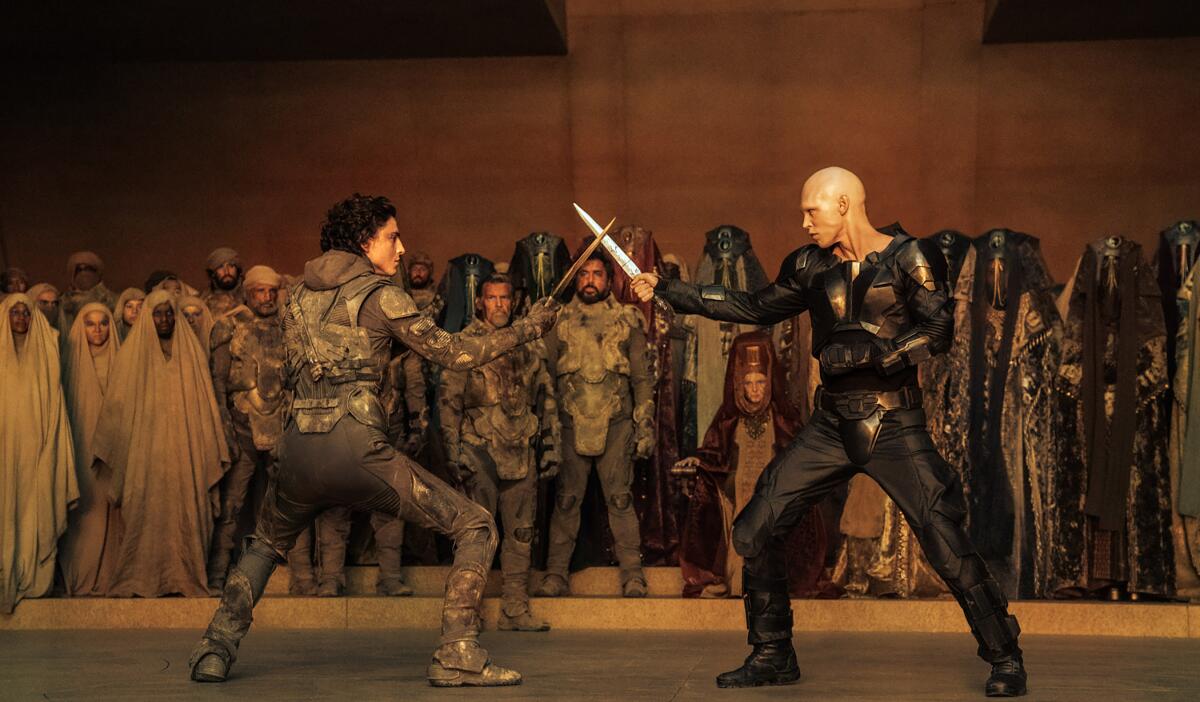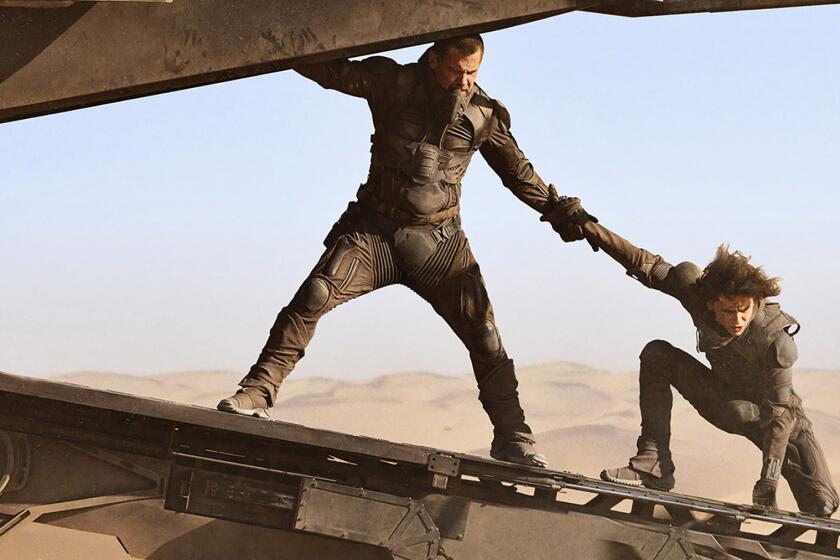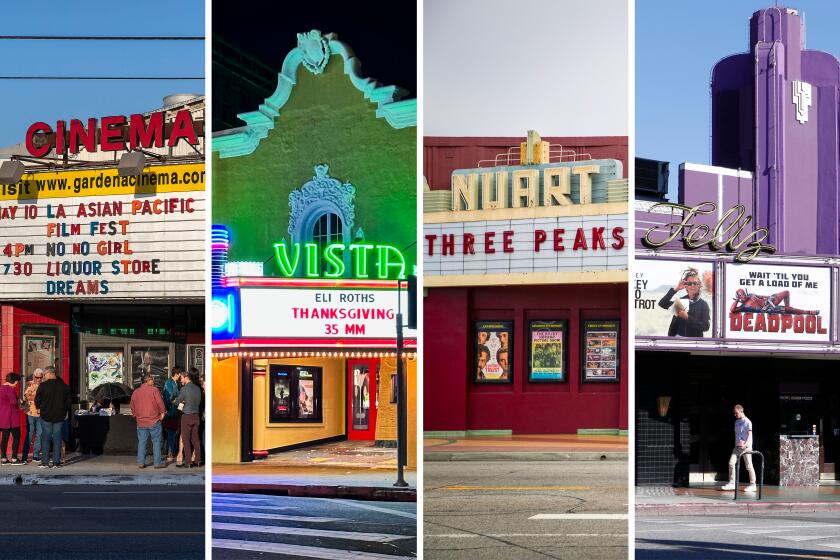Review: ‘Dune: Part Two’ stirs its sands darkly, deepening a sci-fi masterpiece in our midst

- Share via
It takes chutzpah to restart your years-in-the-making sci-fi epic in the womb, but after a quick prologue, that’s basically where “Dune: Part Two” begins. The floating fetus, we’re told, communicates with mother and brother not in the typical ooh, the baby’s kicking fashion, but rather, in full-blown telepathic sentences about interplanetary strategy and guerrilla warfare. She is the unborn Alia and her sibling, Paul Atreides (Timothée Chalamet), has words for her, too: “Sister, Father is dead,” he says, sounding less like a hero on the rise than a glum teenager in need of a hug.
There’s a spooky grandeur to these scenes with the galaxy-brain baby, one in keeping with the overall spirit of Frank Herbert’s revolutionary 1965 novel, which was itself in conversation with a future generation. For all its Campbellian myth building, the book spoke to a dawning audience of young people who wanted drugs (fine, call it “spice”), expanded consciousness and eco-awareness. Over the years, “Dune” has lured the most audacious filmmakers to crash their dream ships on its craggy shores, visionaries like David Lynch and Alejandro Jodorowsky.
I would never have put the spectacle-minded French Canadian filmmaker Denis Villeneuve in their company — and still wouldn’t. But he understands something about “Dune” that those cult creators never did, an insight that makes the second half of his colossal-feeling, frequently staggering adaptation an instant landmark of its genre. (The sentient unborn Alia is Villeneuve’s own invention, a departure from Herbert’s text.) He widens our eyes with big action hugeness — the products of an army of visual effects experts — but then asks us, as he did with 2016’s “Arrival,” to interpret and connect the dots. Less an act of literary fidelity than generosity, his sequel plunges us into the book’s messianic prophecies, but also into spiritual uncertainty, cultural conflict and doubt, as it must. Somehow, Villeneuve has made a “Dune” for right now — and tomorrow.
Timothée Chalamet, Zendaya and Oscar Isaac headline Denis Villeneuve’s seat-rattling adaptation of the Frank Herbert sci-fi classic.
If the chair-rattling first movie prioritized Imax-sized mood over incident (no small feat during our pandemic-challenged 2021), it nonetheless set the billiard balls in motion and we return to them midbreak. Rebecca Ferguson’s pregnant Lady Jessica and Chalamet’s Paul are strangers in a strange land: the sole survivors of House Atreides, their family and army recently murdered in a sneak attack on Arrakis, the arid, unforgiving desert world where precious spice is mined. It’s scary enough to be pursued by armored, faceless soldiers who can float up the sides of canyons, but Jessica and Paul also find themselves barely tolerated by the local Fremen, a blue-eyed people who see them as interchangeable with any other invader.
Their presence is also complicated by an ancient, controversial legend, a tale that anticipates the coming of a revolutionary fighter, the Voice From the Outer World. Almost immediately, undercurrents of colonialism and imposed mysticism elevate Villeneuve’s central performances in ways the first movie could only suggest. Chalamet’s delicate features take on a haunted sharpness as Paul hopes to earn what his mother, the Bene Gesserit priestess Jessica, would rather manipulate into being by converting nonbelievers. (Ferguson, her face tattooed throughout much of the movie, leans into an arresting menace.)
Two finely complex supporting turns add depth to the mother-son survival story: Zendaya’s suspicious Fremen soldier Chani, falling for Paul despite her better judgment; and a roaring, religiously transported Javier Bardem, who, with avuncular warmth, goes all in on the prophecy. There are gigantic sandworms to be mounted and surfed like waves, vials of blue goo to be imbibed for clarifying properties, yet “Dune: Part Two” fixes firmly on the idea of authenticity. At every step, the script (by Villeneuve and returning co-writer Jon Spaihts) injects Herbert’s Arabian-inspired milieu with a countervailing critique. Is Paul, their “desert mouse,” a pretender in hiding?
We’ve mapped out 27 of the best movie theaters in L.A., from the TCL Chinese and the New Beverly to the Alamo Drafthouse and which AMC reigns in Burbank.
Meanwhile, Paul learns to take down spice harvesters and conduct raids, his pale skin covered in dark goggles and shawls. How are we to receive this gargantuan slab of occupation and racial cooptation? It’s a hand grenade of a question that will no doubt be lobbed at “Dune: Part Two,” as it is, sometimes, at 1962’s soaring “Lawrence of Arabia,” the origins of which were an influence on Herbert. The answer will vary from viewer to viewer, but to these eyes Villeneuve enters into what could have been toxic with a conscious, scene-by-scene sense of fatalism, Chalamet stirring his character’s rise with notes of rage, guilt, unhappiness and imposter syndrome. Composer Hans Zimmer’s drone-laden score never strikes a tone of triumphalism; so much of this movie’s tricky poise is his.
Then, on a dime, the film executes a stunning transformation, shifting to the spoiled-milk palette of Giedi Prime, an overindustrialized hellscape illuminated by a “black sun” where a young baron-to-be presents a challenge to Paul’s cosmic birthright. (Boldly, cinematographer Greig Fraser shoehorns in an entire second movie shot in silvery monochrome.) Austin Butler’s commitment to “Elvis” was the stuff of legend, but his eerie Feyd-Rautha Harkonnen may be just as impressive: a pallid, hairless monster prone to roars and dark appetites. These scenes — futuristic fascist rallies and gladiatorial stabbings — lift the whole of “Dune” into a realm of ominous stakes. You lean in for the showdown that’s inevitable.
There are still elements of Herbert’s saga that no filmmaker, not even one as thoughtful as Villeneuve, can solve. It’s got one royal princess too many — here she’s played by Florence Pugh in a role that’s almost as thankless as the part Lynch gave to Virginia Madsen. She can’t be the ultimate prize of a battle this consequential. And the idea of a holy war that turns on the last-minute rediscovery of the “family atomics” seems a touch stuck in the 1960s, even if it is masterminded by a scruffy presence as likable as Josh Brolin.
But has the final stretch of a movie ever leaned so heavily on the quivering chin of one actor? Zendaya wrestles with the ramifications of her Paul turned fierce and vengeful and oh-so-political. Chalamet stomps his foot and the camera shakes.
“Dune: Part Two” isn’t a battle for freedom won, so much as the beginning of something far more cynical, the potential for an entire universe to explode into flames. Villeneuve has made good on one of the great Hollywood gambles in recent memory, delivering a two-part epic of literary nuance, timely significance and maybe even the promise of another film or two. Like that talking baby in the womb, it speaks to what’s coming more than we may know.
'Dune: Part Two'
Rating: PG-13, for sequences of strong violence, some suggestive material and brief strong language
Running time: 2 hours, 46 minutes
Playing: In wide release Friday, March 1
More to Read
Only good movies
Get the Indie Focus newsletter, Mark Olsen's weekly guide to the world of cinema.
You may occasionally receive promotional content from the Los Angeles Times.













